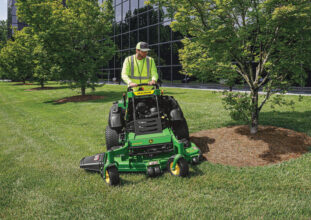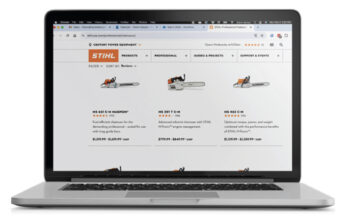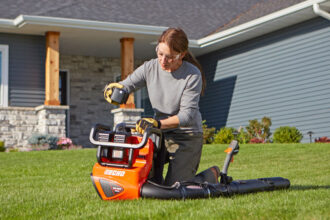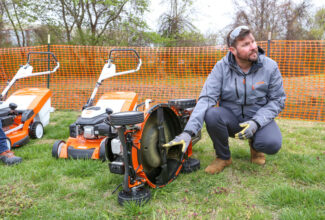Echo Expands Product Mix and Relationships
By Glenn Hansen
“This is a relationship business,” said Harold Redman, President and CEO of Echo Tools, the night before he and his coworkers introduced 21 new products. For this Media Summit event, Echo invited a few journalists as well as members of its User Advisory Group. Made up of pro landscapers, the UAG is a select group of professionals who use Echo and other tools regularly. They also share stories and info through the EchoMeansBusiness.com site and their own social media platforms. Through these relationships, Echo is able to reach far more potential customers than it could through its own branded media.
My coworker John Kmitta, editor of Landscape Business and Sportsfield Management, attended the event at the manufacturer’s Lake Zurich, Ill., manufacturing plant and U.S. headquarters. We saw the manufacturing and warehouse facilities, spent time with Echo’s new products, and sat down with Wayne Thomsen, V.P. of marketing and product management to discuss the current and future state of Echo. We’ll start there.
Manufacturing
OPE Business: We see the 21 new products Echo is launching but give us an idea of how Echo got to this point.
Wayne Thomsen: We’ve launched 175 new products since 2017. We’ve been aggressive in new product development. We’ve expanded the brand and the core of our portfolio with products including generators and pressure washers and hand tools. Our goal is to provide a solution for commercial landscapers, and that then extends to residential buyers and users.

Sales Channels
OPE: Where do these users, commercial or residential, find Echo products and service? What’s your relationship with retailers?
Thomsen: We provide our products through distributor and dealer channels. We have six distributors, and we do dealer-direct wholesale in 29 states and work with independent servicing power-equipment dealers. In Canada, we have a wholly owned subsidiary.
We are also selling through larger retailers including Home Depot, Fleet Farm, Blaine’s, and Tractor Supply. This is an increasing sales line for us, and it can provide advantages for users, like longer store hours, more locations, etc. We know the independent dealer has advantages for consumers too; they can build a relationship with business owners, and they can get product serviced easily if needed.
There are about 1.4 million registered landscape companies. And we know that 72 percent have less than 20 employees. These are small business owners with different needs, in locations all over the U.S., and we want to supply them a variety of locations to get Echo products so they can serve their customers. Some of these retailers have online sales, but Echo does not sell direct to consumers.
Future of Echo?
OPE: Okay, 21 new products leading into 2024. And you talked about brand expansion. So what can we expect in the near future?
Thomsen: We’ll continue to look at push mowers more, and beyond just handheld. Does this extend into riding equipment? Not sure yet. We want to be the best provider of handheld power equipment in the industry. That’s our immediate goal. We measure by marketshare, and we have grown three to four points in the last five years. That’s handheld-equipment marketshare. If you extrapolated by just commercial users, it would be even larger. We can assess that by price points.

And our history is an important part of the story. Echo has been supplying outdoor power equipment for more than 50 years, longer than any handheld supplier. We started in 1972 in the U.S. market with significant contributions, like the first backpack blower (1972), first handheld blower (1975).
OPE: How important are batteries and chargers in Echo’s near future?
Thomsen: Yes, battery-powered tools are important. And it’s important for us to have a multi-technology solution package. It’s not for us to decide what power source or technology people should use. We just want to provide solutions at different price points. Batteries have benefits, and gas-powered tools have benefits, like with storm clean-up and other emergency uses. There must continue to be a blend of technologies.
And if your primary power source right now is gas, you should consider battery-powered products for the future. Be ready to switch.
OPE: What is “Echo Means Business”?
Thomsen: We designed Echo Means Business to support small-business landscapers. They need education on products and on business operations. The User Advisory Group members feed that small-biz group with information. This has been a fulfilling opportunity for us to give back to this community with information and education that can make them stronger businesspeople. The UAG members can get discounts on products, but we don’t require them to use all Echo products.

OPE: What is Echo’s outlook on business and the economy heading into 2024?
Thomsen: We still see some inventory issues. Our market is flooded with inventory. And we are seeing some predatory pricing in places. Still, we think buying will be good in 2024. Through our discussions with distributors and dealers, we’re optimistic.
Here is the complete list of Echo’s new products for 2024.




